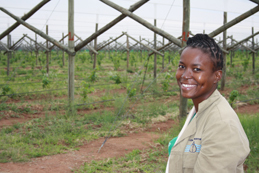
Case Study
Rahlagane
Northern Province
Table grape vineyards were planted at Rahlagane on virgin soils in 2009. Infrastructure was provided under the Comprehensive Agricultural Support Programme, a dedicated initiative of the National Department of Agriculture to help indigenous farmers to establish their businesses.
The South African government rewards progress and effort through various prizes offered to emerging producers. The owners of Rahlagane are extremely proud of a 2012 accolade, awarded to them for being the Best Developing Primary Agricultural Co-operative in the country.
Surprise Shokwane, became a shareholder at Rahlagane five years ago, and was appointed chairperson of Rahlagane Table Grapes Pty Ltd (RTG) in February 2012.
“We are optimistic to reap the fruits of our labour for many years to come. I have been earning a living in different ways, but growing and marketing table grapes can provide me with a better life indeed,” explains Surprise.
“I always enjoyed watching my mother planting fruit and vegetables. Today, I regard table grapes as a unique product in quality and taste, which enriched my passion for agriculture. I have also realised my potential to work with people and to assist the country in creating jobs.”
At Rahlagane, experienced workers are re-employed, so capable hands are resourcefully mentoring new ones. This is a poor community and although farmers are offering jobs to people, not all of the people can be accommodated.
Surprise has some ambitious goals. Since a lease agreement of 25 years has been established between the tribal authority and RTG, Surprise anticipates 100 hectares of well-developed land in five years comprising table grapes, wine grapes and citrus, with their own wine cellar. “We wish to encourage young black South Africans to consider agriculture as a career and we hope that our progress and success would inspire and motivate others to improve the lives of people in Moganyaka Village”, says Surprise.
Not surprisingly, Surprise has visions for a farm of her own. She envisages farming with table grapes and livestock, especially sheep. She intends to save money from the 2012/13 harvest and from many more seasons to come, in order to fulfil this dream.
Currently Rahlagane’s table grape harvest is sold to South African
supermarkets like Spar and Pick ‘n Pay, the Pretoria Fresh Produce
Market and to hawkers. They have begun negotiations with the National
Agricultural Marketing Council (NAMC) and the Perishable Produce Export
Control Board (PPECB) to enter the export market.
For more case studies like this one, download our Power
of the Grape, 2nd edition pdf

